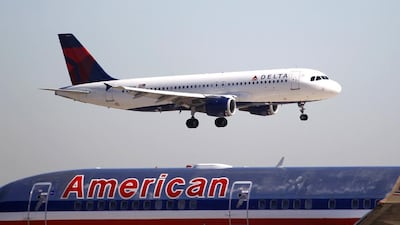American Airlines’ boss is satisfied with a US-UAE deal to resolve a long-running dispute about allegations of government aid but relations with Arabian Gulf rivals are unlikely to thaw immediately.
The carrier needs to see the impact of the agreement and its effect on the growth of Gulf airlines into the US market, Doug Parker, chairman and chief executive, of American Airlines told reporters on Sunday on the sidelines of the International Air Transport Association's annual general meeting in Sydney. It is too soon for its relationship with Gulf airlines to change or for closer ties to become feasible.
“We’re very pleased with the result of the talks between the US government, the UAE and Qatar and we’re grateful for what the US government was able to accomplish there,” Mr Parker said. “While it’s in place we haven’t had enough time to make sure that those resolutions actually have the effect that we hope for.”
Talks between US and the UAE last month affirmed the open skies agreement between the two countries and seemingly has resolved a long-running dispute that centred on US claims that carriers from the Gulf, including Emirates and Etihad, received unfair government subsidies. The Gulf airlines have long denied this, saying their rivals Delta, American Airlines and United were simply unable to compete with their levels of service.
Since 2015, the three largest American carriers have urged the US government to take action against the airlines by restricting their expansion.
Asked if the agreement could change its previously tense relationship with the Gulf airlines and eventually open doors to potential partnerships, Mr Parker said “we need to see more.”
________________
Read more:
Boost for carriers as US and UAE reaffirm open skies agreement and 'fifth freedom' rights
________________
As airline executives gather in Sydney for the aviation meeting, with 130 chief executives and 1,000 delegates, the main issue under the spotlight is oil prices reaching a three-year high, a level that may end an era of unusually high returns.
American airlines, while still profitable, is seeing a higher fuel bill drain its earnings, Mr Parker said.
“The fact is we’re making less money,” he said. “The reality is when your second-largest expense goes up by 40 per cent, the cost of production goes up, the cost to the consumer goes up over time, but that hasn’t been the case yet.”
The hit on profitability from climbing oil prices will hurt airlines.
“It becomes clear this [oil price] is the new normal,” he said. “You would see over time less capacity growth in the industry and therefore higher prices, but I don’t think that’s going to happen in the near-term.”
Many airlines are struggling with the return of oil prices to a level near $80 a barrel, a global pilot shortage and higher airport fees.
Airline executives are also worried about the potential damage to the aviation industry amid growing tensions over international trade.
The Trump government has renewed threats to impose tariffs on China, and implemented duties on steel and aluminium products coming from Canada, Mexico and the European Union.
“We always get concerned when you see tensions elevate around free global trade,” Mr Parker said. “As yet, nothing has affected our revenues, but it’s the kind of thing you watch and hope that countries are able to work together and keep global trade flowing.”
Uncertainty over trade could curb demand for business travel, a key segment for airlines, especially Middle East airlines who rely on premium bookings to boost profits.


